

Lana Del Rey Is Her Own Feminist Hero. Lana Del Rey aka Lizzy Grant's definition of feminism: "a woman who feels free enough to do whatever she wants.
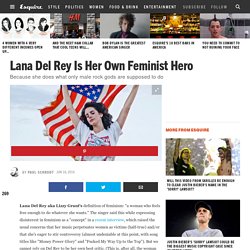
" The singer said this while expressing disinterest in feminism as a "concept" in a recent interview, which raised the usual concerns that her music perpetuates women as victims (half-true) and/or that she's eager to stir controversy (almost undeniable at this point, with song titles like "Money Power Glory" and "Fucked My Way Up to the Top"). But we cannot rely on Del Rey to be her own best critic. (This is, after all, the woman who claims without irony, "I don't think there's any shock value in my stuff. ") She may not call herself a feminist or know much about the history of the movement, but her definition of a feminist — a woman who does what she desires, without limits — is radical, and one that she clearly follows in her work.
Screwing your way to the top? Good for Lana Del Rey for helping kill that myth. The pop-star Lana Del Rey denied this week that she had “slept her way to the top”.
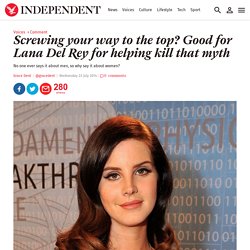
This was the patient response to an interviewer’s question about her song, “F***ed My Way Up To The Top”, in which Lana addresses the sort of wholly idiotic, culturally acceptable trope that occurs whenever a young-ish woman is found being successful at, well, literally anything. Would we still be debating Lana Del Rey's authenticity if she were a man? Lana Del Rey Still Stirs Things Up With ‘Ultraviolence’
Photo LOS ANGELES — In October, before starting an international theater tour, the songwriter Lana Del Rey consulted a clairvoyant.
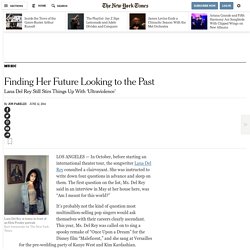
She was instructed to write down four questions in advance and sleep on them. The first question on the list, Ms. Del Rey said in an interview in May at her house here, was “Am I meant for this world?” It’s probably not the kind of question most multimillion-selling pop singers would ask themselves with their careers clearly ascendant. But doubt, regrets, obsessive longing and self-destructive impulses are often at the core of Ms.
Since her emergence on a major label with the single “Video Games” in 2011 and the album “Born to Die” in 2012, Ms. “Ultraviolence” will doubtless stir up more disputes. The music on “Ultraviolence” sets her further outside whatever passes for current pop mainstream. The tracks on “Born to Die” drew on hip-hop, with grunted samples and hefty beats, but now, she said, “I’m not crazy about some of that production.” Mr. Ms. The Imagination of Lana Del Rey. Photo by Erez Avissar There's at least one thing I really like about singer-songwriter Lana Del Rey.
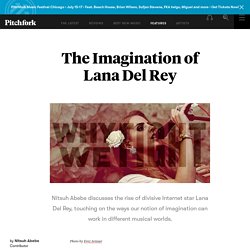
When she described her persona to a Guardian journalist as "Lolita got lost in the hood," the phrase sounded like a well-rehearsed product of the same elevator-pitch brainstorming session that brought us her primary tagline ("a gangster Nancy Sinatra"), or maybe even the artist's name itself. But it also sounds like one of those insanely rare moments wherein someone from the music industry says "Lolita" and actually seems to mean Lolita, as in the novel, and not some kind of porn-derived mincing, but as in the character Dolores Haze: lover of late-40s movie magazines (there's that miasma of "old-Hollywood glamour" Del Rey's inspired by), lover of chewing gum (Stereogum on Del Rey's "secret" show in NYC: "she chewed a lot of gum").
Pretty When You Cry. A few months ago, an unfamiliar man working in my office came up to me and said, "Why don't you give us a smile, honey?
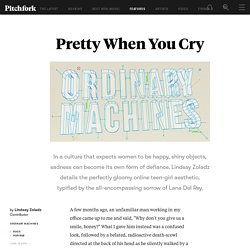
" What I gave him instead was a confused look, followed by a belated, radioactive death-scowl directed at the back of his head as he silently walked by a few of my male colleagues on his way to the door. No one's default facial expression is a smile when staring at a computer screen; anyone who has ever opened PhotoBooth by accident and been unexpectedly greeted with their cow-eyed "I am on the internet" face knows this to be true. But, as the unimaginative cat-caller’s refrain of smile for me, baby too frequently reminds us, society would still prefer women to lacquer on a happy face. Well into the 21st century—in the professional sphere as on the street—too many people expect women to be warmly smiling Stepford Wives emanating sunbeams from their every pore.
If you’re not happy, at least learn how to fake it. Vigier Del Ray Clean Final 18 nov 123. The Meaning of Lana Del Rey. Pop culture, post-feminism and the choices facing young women today By Catherine Vigier The criticism leveled against pop singer Lana Del Rey on the Internet and in the mainstream press raises a number of questions about young women choosing to conform to the image required of them by the corporate media in order to achieve success, and about the conditions under which success can be achieved in the culture industries and elsewhere.
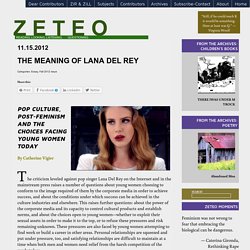
This raises further questions: about the power of the corporate media and its capacity to control cultural products and establish norms, and about the choices open to young women—whether to exploit their sexual assets in order to make it to the top, or to refuse these pressures and risk remaining unknown. Ms. America. Lana Del Rey. Psychoanalysis, Culture and Society - Abstract of article: Undutiful daughters: Growing up in feminism and psychoanalysis. "Undutiful daughters: Growing up in feminism and psychoanalysis" by Margeaux Feldman.
Full-Time Daughter. Lana Del Rey’s Americana shows its demand for a feminine desire that knows how to long for death.
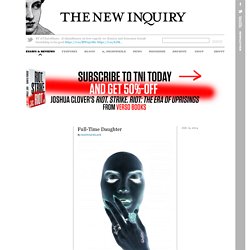
Lana Del Rey uses the imagery of American nationalism to construct the kind of iconic girlhood that white America goes crazy for. But her relation to this history feels complicated. She aims to be “classic,” an aesthetic throwback to a bygone time when music was music and men were men and so on. But something is wrong with the picture. Ostensibly, she gives white America what it wants—an image of itself as lethal but beautiful, guilty but forgiven, an image of violence as indistinguishable from romance.
The Curious Case Of Lana Del Rey And Feminism. By Katie Bielamowicz Lana del Rey caused quite the storm with her debut album “Born To Die,” for its seemingly anti-feminist lyrics.

But if any of the critics, the bloggers, the reviewers took the time for a closer look, they would see a deeply troubled young girl, instead of some pop fad setting women back 50 years. Femme Red: Why Does Lana Del Rey Get Bashed For Being Anti-Feminist? A few months ago my friend Lucia e-mailed me another batch of songs she thought I'd like (that’s one of our rituals).
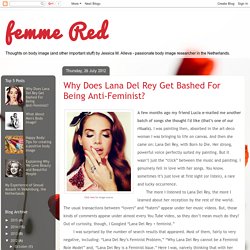
I was painting then, absorbed in the art-deco woman I was bringing to life on canvas. And then she came on: Lana Del Rey, with Born to Die. Her strong, powerful voice perfectly suited my painting. But it wasn’t just the “click” between the music and painting. I genuinely fell in love with her songs. The more I listened to Lana Del Rey, the more I learned about her reception by the rest of the world.
I was surprised by the number of search results that appeared. It’s time to stop hating on Lana Del Rey. A strange thing happened when I sat down to write the review for this week’s CD of the Week, which is Lana Del Rey’s latest album, Ultraviolence.
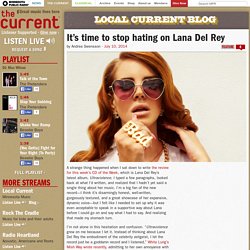
THE STYLING DUTCHMAN.: FEMINISM 101: On Patriarchy, Authenticity and Lana Del Rey. I'm sure you all have heard about the new indie darling with her bee stung lips, sultry siren voice, eerily beautiful songs and retro aesthetic. I'm also pretty sure that you've noticed that right when the hype began taking off, the fall was soon to follow. Stories about her being a product, a fake, a dupe meticulously styled and marketed by her record company crept into the discourse when we learned about her (not so secret) past as Lizzy Grant (seriously, watch that vid and this one and tell me her singing and style are entirely different now compared to before the 'rebranding') and then there was that pivotal SNL performance that garnered her nothing but ridicule and /rolleyez.
Now, one can't argue with taste, so I'm not going to try and turn all of you into rabid Lana Del Rey fans. However, the backlash against her makes me sick and has nothing to do with liking or disliking her music. It is just another case of patriarchy. Born to Die: Lana Del Rey and the Modern Feminine Performance. There’s something I find incredibly compelling and deliciously problematic – from a feminist point of view – about Lana Del Rey.
It didn’t crystallise for me until I read Pitchfork’s fairly damning review of her debut effort, Born to Die. How Lana Del Rey, Sam Smith, and Halsey Represent The Bottom Of The Privilege Pop Barrel. On the one hand, the 2010s have been a resurgent renaissance of pop music. Every poptimist in your life who has ever gotten tired of having to defend the value of "pop" music (as broad as that almost meaningless catch-all term can be) has been validated by the fact that this decade has seen a flood of pop music that isn't simply blowing up the charts; it's winning critical acclaim. Charli XCX, Lady Gaga (at least the early records), Adele, Carly Rae Jepsen, Beyonce. It hasn't been this easy to love pop music since the 80s. Dear Lana Del Rey: You Are Not a Latina Gangsta Girl, So Cut the Shit. Other Links.